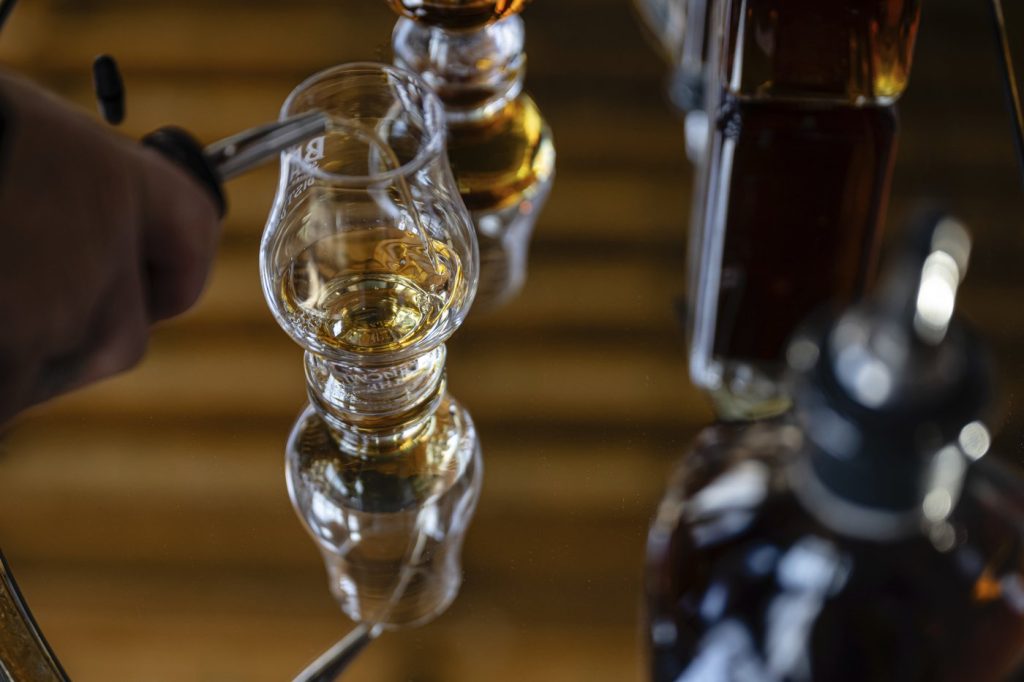LOUISVILLE, Ky. (AP) — The Brough Brothers Distillery, a Black-owned bourbon maker in Kentucky, is poised to activate its business plan with the imminent opening of a new distillery. The company aimed to increase whiskey production to enter lucrative markets in Canada and Europe. However, ongoing trade uncertainties, particularly the threat of tariffs initiated by former President Donald Trump, have disrupted these expansion plans.
Victor Yarbrough, the CEO of Brough Brothers Distillery, stated that efforts to penetrate the Canadian market, as well as plans to introduce products in Germany and France, are currently stalled. He emphasized the challenges posed by trade conflicts that have significant implications for American-made spirits as they seek to gain a foothold in international markets.
Yarbrough expressed his frustration, stating, “We are collateral damage.” The political landscape surrounding the bourbon industry has become increasingly sensitive, especially as public relations trials persist from Trump’s “America First” strategy in international relations. Canadian consumers are reported to have responded negatively, with incidents of booing the U.S. national anthem and liquor stores removing American spirits from shelves before any conclusive tariff decisions were made.
As the Brough Brothers prepare their new distillery along the Ohio River, they are hopeful that their upgrade will enhance the company's visibility in the highly competitive bourbon market. Yarbrough indicated that repairing international relationships is critical and suggested a media and PR blitz might be necessary to navigate the current climate.
Trade wars present immediate dangers to American distillers, particularly as they capitalize on the increasing global demand for bourbon, Tennessee whiskey, and other spirits. Kentucky Governor Andy Beshear criticized the erratic nature of the tariff policies, suggesting they undermine the stability necessary for economic growth. He highlighted how the month-to-month volatility creates uncertainty that hampers business operations.
Trump recently postponed the implementation of 25% tariffs on select imports from Canada, but Yarbrough clarified that this temporary reprieve did not resolve the company's challenges. He explained that the unpredictability of the tariff situation continues to cast uncertainty over their expansion plans, making long-term strategies nearly impossible to formulate.
The whiskey industry in Kentucky, which produces 95% of the world's bourbon supply, is particularly impacted by such trade conflicts. Judy Hollis Jones, the president and CEO of Buzzard’s Roost in Louisville, echoed the concerns for the industry, noting that a mere postponement of tariffs does little to alleviate the long-term planning difficulties faced by distillers.
The Kentucky Distillers’ Association has long warned of the impact of tariffs and retaliatory measures on the spirits industry. The potential reinstatement of an EU tariff on American whiskey by April 1 poses an additional threat, echoing the damage caused by previous Trump-era tariffs, which resulted in a significant drop in exports to Europe between 2018 and 2021, resulting in over $100 million in losses for U.S. distillers. Once the tariffs were lifted, American whiskey sales in the EU did rebound.
Now, a proposed 50% tariff, double the previous levy, presents a new risk of “irreparable harm” to both large and small distillers. Chris Swonger, CEO of the Distilled Spirits Council, emphasized that such tariffs are a tax burden that distillers must either absorb or pass on to consumers, with potential repercussions on market share in competitive sectors.
While larger distilling companies may possess the resources to withstand these changes, smaller producers like Brough Brothers and The Bard Distillery in Muhlenberg County feel the strain acutely. Tom Bard reported that despite strong market growth in Canada, new purchase orders are on hold due to ongoing tariff conflicts, and he expressed concern over how such disruptions could jeopardize the future of smaller businesses. Bard planned to ramp up domestic sales to compensate for the loss of Canadian opportunities.
As the uncertainty persists, the Brough Brothers Distillery continues to evaluate its options in the face of a potentially prolonged trade war.










